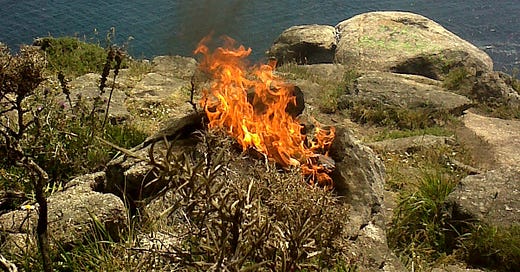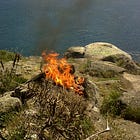Finisterre - Preface
I took 1000-mile walk along the Camino de Santiago from the South of France to the coast of Spain. A midlife journey of love and loss. Here's the story.
In the spring I will walk the Chemin de Saint Jacques de Compostelle to Santiago, Spain, along one of the four main pilgrimage routes from France. The walk is literally a journey of a thousand miles, the one we’ve all heard about, the one that starts with the single step.
Mine will start at the doorstep of our home in Rognes, France just north of Aix-en-Provence in the southeast. I’ll walk through the early spring grapevines behind our house and then up into the hills overlooking our small town, then over to Arles, on towards Toulouse, through the rising Pyrenees, then Basque country, Jaca, the hot plains of northern Spain and beyond and beyond and beyond, until I run out of continent on the coast of Spain. March, April, May, possibly early June.
I plan to stay in ten euro a night pilgrimage hostels. When it is my turn at the refugio spigot, I’ll clean my clothes beneath the cold tap. I’ll dry them in my bunk on a cord I stretch over my sleeping bag. I’ll tend to my aching pilgrim back and knees and feet and try to keep my spirits up. Officially, the pilgrimage ends with a special service in the great cathedral in Santiago de Compostela, but many pilgrims continue on for another three days to get to Finisterre, which is further along and out on the coast. I plan to do that final leg as well.
The last of the die-hard pilgrims make this final push out to the ocean, heading slowly and painfully to the finis terre, literally “the end of the world.” Undoubtedly, an unremarkable daily fishing life moves about them there, a steady life taking little or no notice of them, although, I imagine, some of the older folks acknowledge the pilgrims with a respectful nod as they head through their town.
When they get to the top of the lighthouse cliff, pilgrims set small fires on the hard soil and, as is the custom, they burn their boots, poking at them for a bit, an acrid black smoke filling the air. Then they find a quiet rock and stare out at the blank Atlantic.
If I make it to Finisterre, I will take my own final look at the edge of the world, a long, steady look to try to freeze and fix the moment, to will my mind to remember, to beg it to please save this, a prayer to the gods of memory. And then I will turn away, and head off to my bus or train station, knowing that I will never do anything like it again.






